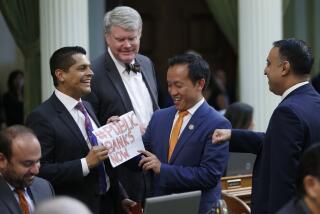Activists Oppose Bank Merger : Finance: More than 100 demonstrate, claiming that the two Japanese firms fail to invest in communities from which they take their deposits.
- Share via
More than 100 noisy protesters ringed the Mitsui Bank building in Los Angeles on Thursday to oppose the world’s largest bank merger, involving two Japanese firms that rarely make loans to home renovators, nonprofit church developers, fledgling inner-city businesses or most other ventures fighting urban decline in California.
A diverse coalition including the city of West Hollywood, Concerned Citizens of South-Central Los Angeles and Little Tokyo Service Center alleges that Mitsui Bank Ltd. and Taiyo Kobe Bank Ltd. are violating the federal Community Reinvestment Act by failing to invest in communities from which they accept deposits.
In Los Angeles’s busy financial district, the scores of chanting protesters--including 78 uniformed schoolchildren from St. Vincent’s School near downtown--caused motorists to slow and wave as the children held up signs reading, “Mitsui Loans for Education, Not Speculation.”
Gilda Haas, a protest organizer, said the coalition, known as Communities for Accountable Reinvestment, is challenging Mitsui Bank to “put some of their vast money into solid investments in low-income areas. This is absolutely not a call for charity.”
The groups have formally complained to the Federal Reserve Bank Board that Mitsui has ignored community needs. If the regulators agree, the merger of the American operations of the two banks could be denied, said Federal Reserve spokesman Ron Supinski in San Francisco.
In Los Angeles, William LaBelle, an executive vice president with Mitsui Manufacturer’s Bank, the American arm of Tokyo-based Mitsui Bank Ltd., said he could not speak for the bank headquarters. However, he said his subsidiary is “taking all criticisms under serious advisement and we are looking at (the coalition’s) requests right now.”
LaBelle said his bank will respond in mid-March. Federal regulators are expected to rule on the issue by March 13, but could delay any decision by 30 days.
Whatever the outcome, Thursday’s protest pointed up the growing sophistication of anti-poverty groups in Southern California, where attacks on bank mergers have been rare, compared to escalating incidents in San Francisco, Atlanta and other major cities.
Federal Reserve spokesman Supinski said that while many protests fail, “a lot of areas have succeeded and have gotten concessions from bankers.”
Los Angeles activists may get help from City Hall, where Mayor Tom Bradley has spearheaded an effort to identify banks that do not invest in low-income areas. Once the study is completed in November by the Western Center for Law and Poverty, the city, which controls hundreds of millions of dollars in deposits, hopes to influence bank investment policies, Bradley has said.
Congress passed the Community Reinvestment Act in 1977 to correct widespread redlining by banks, which resisted opening branches in working-class and minority areas and seldom approved loans involving business renewal, home-buying or home renovating in the urban core.
Banks have resisted changing longtime practices despite a growing body of proof that minority and poor communities do not have the high loan default levels that are typically attributed to them by lenders.
One dramatic example is that of the Savings Assn. Mortgage Co., a pool of 54 savings and loan institutions in California that has made $200 million in loans to develop 7,000 units of low-income housing in inner-city areas statewide.
Doris Schneider, president of the group, said Thursday that the organization “has never had a single 30-day default.”
Jackie Dupont Walker, president of Ward Economic Development Corp., an affiliate of Ward AME Church, said she is “tired of banks turning down loans to churches that are 100 years old, who can show a great track record in their books, and who have demonstrated management ability.”
Black church-affiliated groups such as Walker’s are behind a growing trend in economically depressed South-Central Los Angeles to build affordable rental housing.
But Walker said many Los Angeles banks refuse to view the Sunday cash offerings from worshipers as “accounts receivable” when churches seek loans.
“Given its wealth, Mitsui could set a precedent by establishing a new underwriting criteria,” she said.
LaBelle, of Mitsui, pointed out that his subsidiary “is very concerned with complying with the (Community Reinvestment Act),” and has invested $1 million, along with other banks, in a $100-million loan pool for low-income housing.
However, the $1-million effort by the American branch represents a small fraction of the more than $350 billion in assets controlled by the newly merged Japanese parent companies.
More to Read
Inside the business of entertainment
The Wide Shot brings you news, analysis and insights on everything from streaming wars to production — and what it all means for the future.
You may occasionally receive promotional content from the Los Angeles Times.










